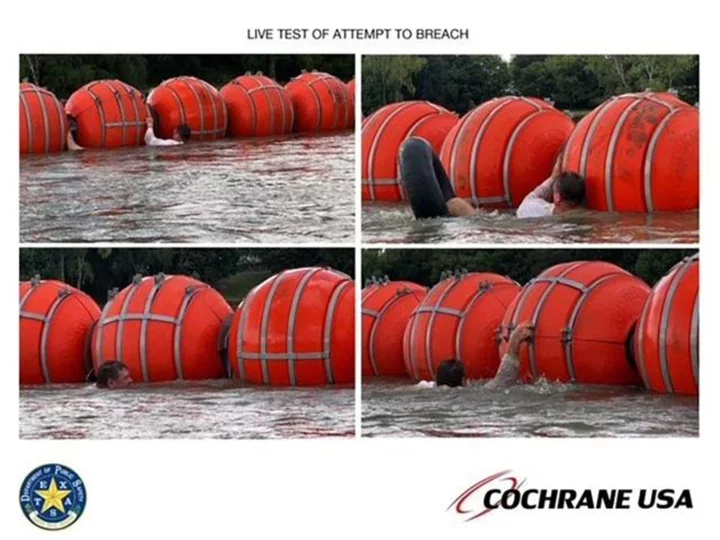Texas Gov. Greg Abbott on Thursday announced plans to deploy a floating marine barrier along the Rio Grande to deter illegal crossings at the US-Mexico border.
The announcement came during a bill signing in Austin, Texas.
Abbott, a longtime critic of the Biden administration's border policies, said he intends to float the first 1,000 feet of the barrier in the river near the city of Eagle Pass in Maverick County. In 2022, a Texas National Guardsman drowned in the Rio Grande attempting to rescue a woman crossing the river.
"This is a new water-based barrier ... we can put mile after mile after mile of these buoys," the governor said while showing an artist's illustration of the buoy barrier. "What we are doing right now, we are securing the border at the border -- what these buoys will allow us to do is to prevent people from even getting to the border," he added.
Texas Department of Public Safety Director Col. Steven McCraw, also in attendance at the event, touted that the buoy barrier can be "quickly deployed," moved, and is mobile.
While explaining the idea, McCraw claimed the floating buoy barrier is something US Border Patrol had designed and tested.
"We don't want anybody to get hurt," McGraw said. "In fact, we want to prevent people from getting hurt, prevent people from drowning, and this a proactive way."
McGraw said the floating barrier will be a deterrent to keep migrants from entering the Rio Grande.
"Importantly, the governor was also concerned about loss of life, you know was this going to be a risk to migrants coming across, family units along those lines and the answer is anytime they get into that water it's a risk to the migrants," said McGraw.
He admitted there were "ways to overcome" the floating barrier but "it takes great effort, specialized skills, and equipment to do it."
McGraw said the buoy will be anchored to the bottom of the waterway. He added that the buoys are roughly four to six feet in height depending on the water level.
He claims the first deployment cost is under $1 million dollars.
David Donatti, an attorney at the ACLU of Texas, responded to the plan saying, "The chain of buoys along the Rio Grande is just the latest in a chain of gifts from the state to private contractors to fuel the governor's manufactured crisis at the border. The floating balls will not address the real and important reasons people are coming to the United States. The buoys are a blight on Texas's moral conscience."
McGraw said the date for initial deployment is July 7th.

